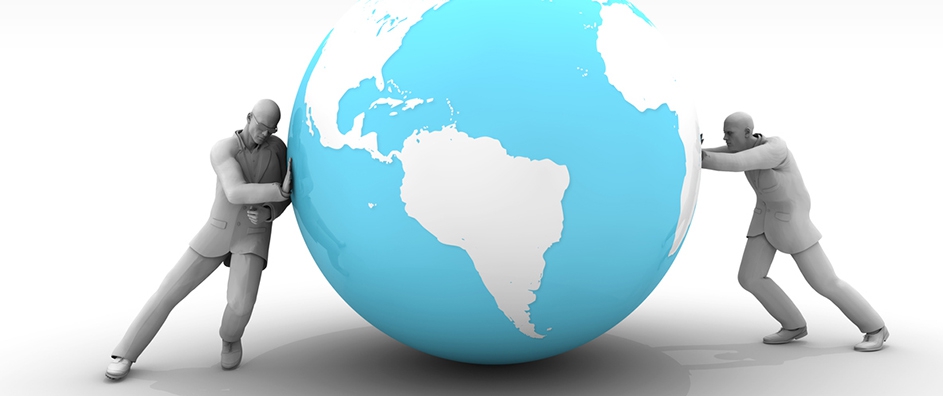The views expressed in our content reflect individual perspectives and do not represent the authoritative views of the Baha'i Faith.
Will we all, one day, live in a more unified, globalized world—or will we always live in a world partitioned into separate nations?
That’s the central question in the raging, growing modern debate between globalism and nationalism.
History shows us that humanity tends, over time, to organize itself in the most inclusive and widest systems possible. That’s why nationalism, Baha’is believe, has passed its prime. “The fetish of absolute national sovereignty,” The Universal House of Justice wrote, “is on its way to extinction.”
With each passing crisis in world affairs, it becomes easier for the citizen to distinguish between a love of country that enriches one’s life, and submission to inflammatory rhetoric designed to provoke hatred and fear of others. Even where it is expedient to participate in the familiar nationalistic rites, public response is as often marked by feelings of awkwardness as it is by the strong convictions and ready enthusiasm of earlier times. The effect has been reinforced by the restructuring steadily taking place in the international order. Whatever the shortcomings of the United Nations system in its present form, and however handicapped its ability to take collective military action against aggression, no one can mistake the fact that the fetish of absolute national sovereignty is on its way to extinction. – The Universal House of Justice, April 2002, To the World’s Religious Leaders, p. 3.
But how could nationalism—the reigning political paradigm for the past few centuries, and the cause of humanity’s greatest conflicts—ever become extinct? The Guardian of the Baha’i Faith, Shoghi Effendi, explained the arc of human history and its evolving systems of organization this way:
Unification of the whole of mankind is the hall-mark of the stage which human society is now approaching. Unity of family, of tribe, of city-state, and nation have been successively attempted and fully established. World unity is the goal towards which a harassed humanity is striving. Nation-building has come to an end. The anarchy inherent in state sovereignty is moving towards a climax. A world, growing to maturity, must abandon this fetish, recognize the oneness and wholeness of human relationships, and establish once for all the machinery that can best incarnate this fundamental principle of its life. – The World Order of Baha’u’llah, p. 202.
If you look carefully, you can see the unification of the world, the obvious and inevitable next stage of human development, breaking out all over. It appears in technology, in trade, in medicine, in international relations, in travel, in cultural understanding, in environmental awareness, and in a thousand other ways. Never before has humanity grown more closely connected to one another.
This meta-trend, though, doesn’t make everyone happy.
In fact, globalism threatens the continued dominance of nationalism, and the nationalists have waged a fierce rear-guard action to protect the perquisites and privileges they’ve amassed under nationalistic rule. Here’s what one nationalist British pundit, Frank Davis, had to say about that clash:
There is a profound collision emerging between rich, elite, globalist progressives and not-so-rich nationalist conservatives. It’s a collision between ideals and realities. It’s a collision as profound as the collision in the past century between utopian socialism and capitalism. If it is not yet a war, it sure looks set to become one soon.
Do you see the bias there? He calls globalists “rich” and “elite,” the standard code words for out-of-touch autocrats. Yet most people who want to see more unity in the world don’t fit that definition at all—in fact, many worldwide surveys have shown that large majorities of people in poor, under-developed countries support a strong system of global governance. Nationalists, those same surveys show, tend to come from wealthier, more developed, so-called “first-world” countries, and often see their nationalism as a way to protect their dominance, their fortunes and their positions of power.
So we can safely conclude that the central question in the globalism vs. nationalism debate revolves around wealth and power, like so many other questions about governing human beings. When tribal units first organized into city-states; and when city-states first became nations, people fought to hold on to the past, too. The rulers and the powerful in the existing political order attempted to defeat the new paradigm, and fought hard against the loss of their influence, but they ultimately lost. The great historian Arnold Toynbee saw it this way:
The last stage but one of every civilisation, is characterised by the forced political unification of its constituent parts, into a single greater whole.
The twentieth century will be chiefly remembered by future generations not as an era of political conflicts or technical inventions, but as an age in which human society dared to think of the welfare of the whole human race as a practical objective.
That’s why the Baha’i teachings remind us that every progressive movement toward a more peaceful and more unified world has faced strong antagonism. This passage from Shoghi Effendi, written in the 1930’s, reflects on the idealistic push at the time for unity in Europe and a way to curb the worst horrors of World War I with the Geneva Convention:
The fierce opposition which greeted the abortive scheme of the Geneva Protocol; the ridicule poured upon the proposal for a United States of Europe which was subsequently advanced, and the failure of the general scheme for the economic union of Europe, may appear as setbacks to the efforts which a handful of foresighted people are earnestly exerting to advance this noble ideal. And yet, are we not justified in deriving fresh encouragement when we observe that the very consideration of such proposals is in itself an evidence of their steady growth in the minds and hearts of men? In the organized attempts that are being made to discredit so exalted a conception are we not witnessing the repetition, on a larger scale, of those stirring struggles and fierce controversies that preceded the birth, and assisted in the reconstruction, of the unified nations of the West? – Shoghi Effendi, The World Order of Baha’u’llah, pp. 44-45.
When the Baha’i teachings allude, as they do here, to the “unified nations of the West,” what does that mean? In the next essay in this series, we’ll try to answer that question by looking at the formation of the United States of America. You may be amazed with what the Baha’i writings have to say about the federalized U.S. system of fifty states, and how they serve as a model for the unification of nations.
You May Also Like
Comments

















Chomsky calls them - much to the point - "private tyranies". They set their own rules above national law and are de facto beholden to nobody. Without mandate by anybody thy make strides towards systematically circumventing national law with so-called "trade agreements", which come with their own courts of arbitration.
Our discussion shouldn't just focus on whether or not we want global governance, but what kind we want. If the legitimate governments of the world don't make any successful effort towards filling that vaccant global stage, then other forces will fill it according to their own ...desing - and we can't even blame them for it.
Since a century the international organizational level has been either vacant or occupied half-heartedly (by the UN) and simultaneously become increasingly necessary. Thus a new breed of players stepped in and while the politicians around the world are trying to play cricket they play rugby. "Globalization" today is mainly driven by International corporations and they want it to happen according to their rules. They have no century lasting history of approximation between the interests of rulers and ...ruled as do modern nation states, they go for profit and see the world and its peoples as commodities.
... -->
If we want to have peace and wellbeing we must work in our neighborhoods and then people will become their own advocates and work for their mutual wellbeing.